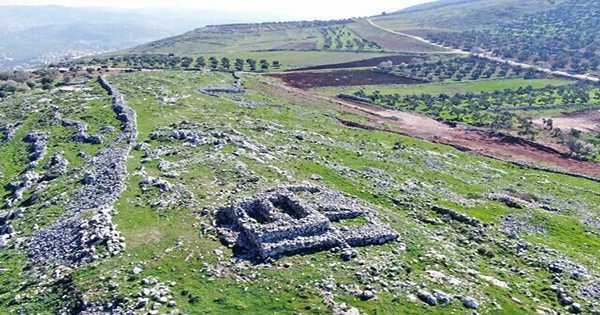At IFLScience, we adore a cursed old artifact. Whether it’s an enormous black sarcophagus filled with delicious mummy juice, a millennia-old and definitely lethal slab of tomb cheese, or the Ark of the Covenant itself, the discovery of a link to our ancestors – especially the really pissed off ones, apparently – is endlessly fascinating to our modern minds. As a result, the recent discovery of an old “curse tablet” on the West Bank has attracted some curiosity.
The folded lead tablet is roughly the size of a postage stamp, measuring around 6 square centimeters (1 square inch), yet it has a significant message. An inscription engraved in 40 proto-Hebrew letters on the inner and exterior surfaces of the lead reads, “Cursed, cursed, cursed – cursed by the God Yahweh.” “You shall be doomed to die.” You will undoubtedly perish if you are cursed. Yahweh has cursed me — cursed, cursed, cursed.” It’s a strong warning to people who breach a covenant’s conditions.
The tablet hasn’t been independently authenticated or dated, and it hasn’t been peer-reviewed yet, but the excavation team claims it’s roughly 3,200 years old. If accurate, this is big news: it would precede all other curse tablets by centuries, as well as all other specimens of early Hebrew writing. “We now have the name ‘Yahweh,’ the biblical God of Israel, in an inscription dating from (Late Bronze Era II), which is earlier than many skeptics would argue the Bible existed or that there was even the ability to write down a sacred text,” said Scott Stripling, director of The Bible Seminary’s Archaeological Studies Institute in Katy, Texas, who led the excavation.
While similar “curse tablets” have been discovered elsewhere, this is the first time they’ve been discovered in the West Bank – despite the fact that the team discovered the find by “wet-sifting,” or washing sediments with water, material discarded from excavations on Mount Ebal more than 30 years ago. According to a statement viewed by IFLScience, Ebal is referred to as “the mountain of curse” in the biblical books of Joshua and Deuteronomy. “However, this sentence is more than a curse. At a news conference regarding the finding, Gershon Galil, a biblical studies professor from the University of Haifa, informed reporters, “It’s truly a legal text.” “It’s not simply a legal warning — it’s a punishment.”
“It’s a legal document,” he explained, “comparable to other old Middle Eastern legal economic inscriptions.” The age of the Tanakh, or Old Testament, has long been a source of contention among biblical academics and archeologists. The Dead Sea Scrolls, written between the third and first centuries BCE, are currently the authoritative date artifacts. Others believe in the Deuteronomistic Theory, which claims that the biblical writings from Deuteronomy to Kings were written all at once between 300 and 600 BCE as a type of historical guidebook for events that occurred centuries earlier.
In 2002, archeologists Israel Finkelstein and Neil Asher Silberman concluded, “The conclusion – that Exodus did not happen at the period and in the way recounted in the Bible – appears indisputable.” “Repeated excavations and surveys over the whole region have failed to uncover even the tiniest trace of activity… “Not a single sherd was left by a small retreating band of terrified refugees.”
Finkelstein believes that the same skepticism should be used now. Finkelstein told Live Science that there is a “huge gap” between the descriptions of the curse tablet and the assertions made by Stripling and his colleagues, and that there are many concerns that need to be answered before we start rewriting history books.
While Finkelstein, who was not involved in the discovery, acknowledged that detailed analysis of any claims would have to wait until peer-reviewed results were published – a paper is due later this year, according to ABR researchers – he questioned the tablet’s dating and translation, as well as the context in which it was discovered. “I’m offended by spectacular claims of findings that apparently overturn everything we know about the Bible and ancient Israel’s history,” he told Live Science.
















